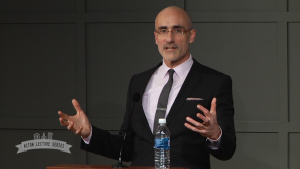


Imagine a president who regularly steps on his own shoelaces and seems to waste power. This president inspires an especially venomous reaction from the press. They actually have contempt for him. He repeatedly harms his own agenda by violating established norms with little regard for the negative impact of doing so. The institution of the presidency relies significantly on a reserve of social and cultural capital built up over the two plus centuries of its existence. My hypothetical president shows little concern for the consequences of depleting that capital. The result is likely to be, at a minimum, that he will have difficulty pushing his agenda forward.
Despite this situation, such a presidency can be a boon to the nation. Readers may need to stop and wipe the coffee off of their screens. Let me repeat: such a presidency can be a boon.
Let us now imagine an alternate scenario. Conjure up the image of a leader who is urbane and an intellectual. This person understands how to manipulate the levers of power to achieve the results he/she may desire. Further, this person has an ambitious dream of shaping policy to bring about a more just and verdant world and believes that an enlightened will is all that is necessary to bring it about. One might recall a significant candidate of the past who famously claimed that “political will is a renewable resource,” thus implying that we need only to want something to happen badly enough in order to bring it about.
This alternative leader, cultured and intellectual in nature, presents a substantial threat to the well-being of American enterprise. While the first president will likely continue to make headlines with tweets and push little actual policy, the alternative president would inspire admiration by many for good temperament and theoretical sophistication and would successfully make big changes. The problem with this alternative president is that he/she would likely privilege moral satisfaction over the actual flourishing of the American people and the economy upon which they depend.
Consider an issue such as the corporate tax. Our alternative president would likely view an increase in the corporate tax (which is already petitive) as a successful blow for social justice which would produce greater redistribution of wealth. Certainly, there would be academics to say so. In addition, our alternative chief would believe that many regulations dictating conditions to functioning businesses would all produce greater justice at little cost. The social planners would likely provide promises that it is so. While elites have largely abandoned the idea of government owning and operating most types of enterprises, they have found it much simpler to dictate conditions with little accountability on the state’s end.
Counter to many expectations, when our uncouth es into office, the stock market roars and even sophisticated Wall Streeters cautiously admit that he may be good for business. Is it his extremely fine economic mind? Is it his ability to set people at ease with his perfect manners and smooth rhetoric? No. These things are missing. But he has one quality they find highly reassuring.
He does not seem to agree with the highly refined geniuses who look upon businesses as a giant lemon which can be squeezed this way and that so as to bring about a quasi-paradise. This galoot does not believe that wages can simply be dictated and the payroll departments can be told to radically re-organize the way they’ve done business for years. He has been in business and knows that the regulatory hit could be even more damaging than high taxes. He is a schlub, but a practical one in many ways. Let’s say he has a street-level intuition about the limits of bureaucracy.
This first president, the one who doesn’t cut a fine figure in suits and resembles eccentric characters from the world of fiction, isn’t going to get much done. That’s okay. Some of his ideas are probably not great and are better left on a campaign website. For some, that is a bad thing. But it also happens that many think he won’t achieve political goals…and THAT is a good thing.
President number one is not very good at making the engine of government hum, but we may discover that such a quality is a feature and not a bug. When es to growing the state, Americans may find that they prefer an amateur to a pro.
Photo: Public Domain, tpsdave









